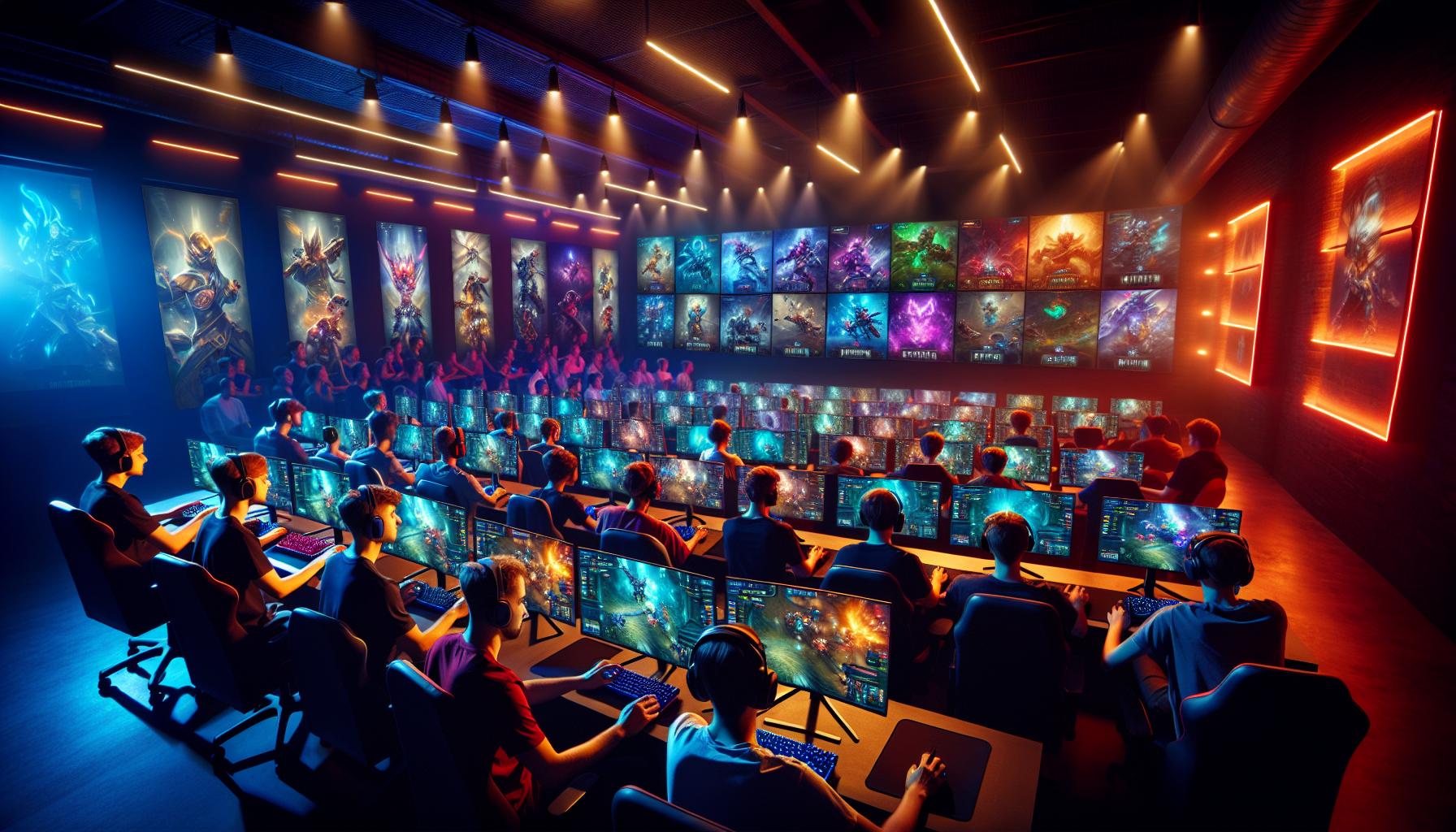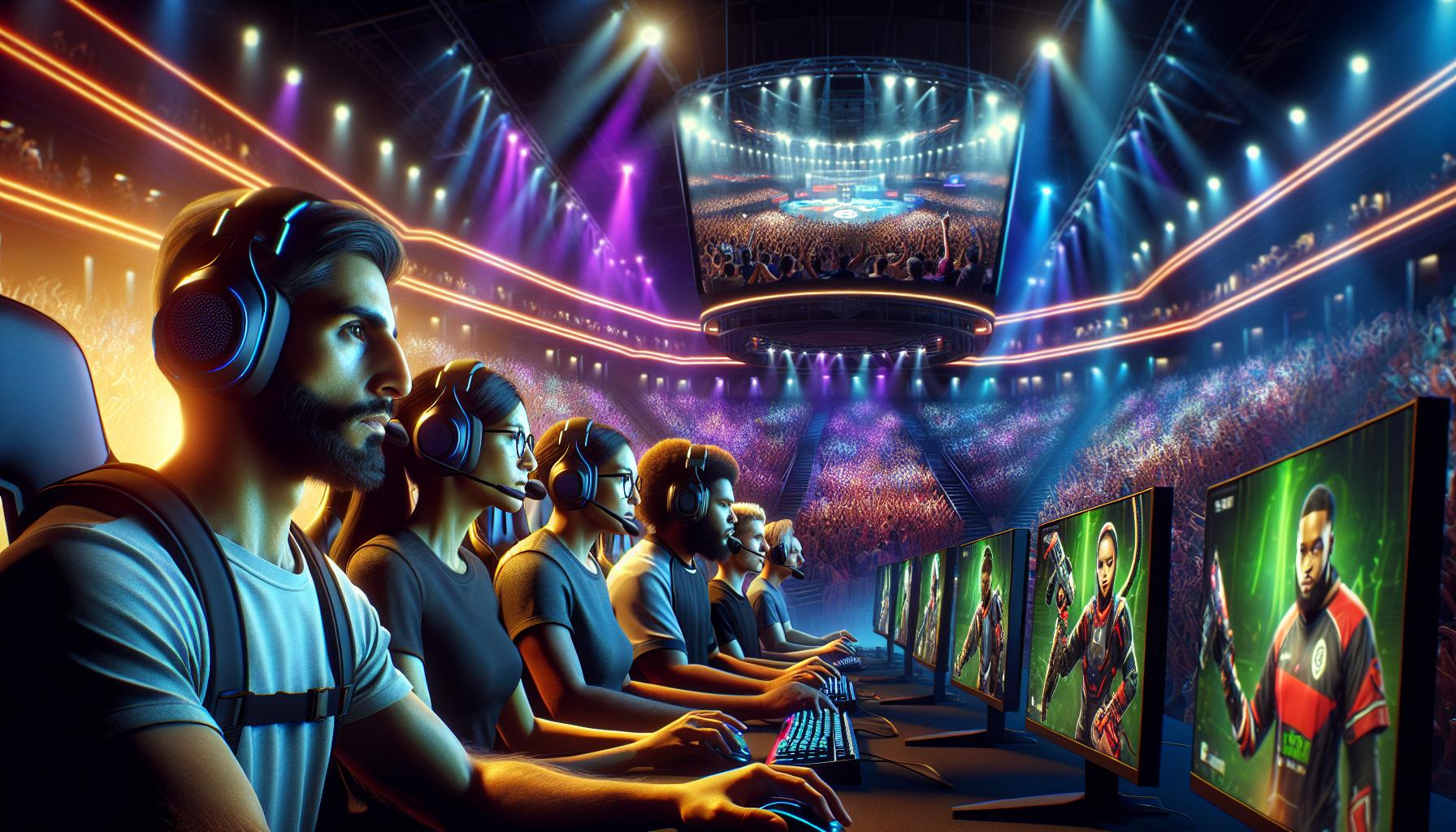Esports has exploded in popularity, transforming from niche competitions into a global phenomenon. Millions tune in to watch professional gamers battle it out in thrilling tournaments, with some events even filling stadiums. This surge in interest has brought a diverse range of games into the spotlight, captivating both players and fans alike.
From fast-paced shooters to strategic MOBAs, the landscape of esports is vibrant and ever-evolving. Titles like League of Legends and Counter-Strike: Global Offensive have set the standard, while newer contenders continue to emerge. As the esports scene grows, so does the excitement surrounding these games, making them a key part of modern entertainment culture.
Key Takeaways
- Esports Growth: Esports has rapidly evolved into a global phenomenon, attracting millions of viewers and players worldwide, making it a significant part of modern entertainment culture.
- Diverse Game Genres: Popular esports games span three primary genres: First-Person Shooters (FPS), Multiplayer Online Battle Arena (MOBA), and Real-Time Strategy (RTS), each offering distinct gameplay experiences.
- Top Titles: Leading games like League of Legends, Counter-Strike: Global Offensive, Dota 2, Fortnite, and Call of Duty dominate the esports scene, with high viewership and competitive tournaments.
- Major Events: Big annual tournaments, such as the League of Legends World Championship and The International for Dota 2, showcase elite talent and engage millions of fans, reflecting the competitive nature of esports.
- Community and Strategy: Success in esports requires a combination of teamwork, strategy, and skill, attracting dedicated player bases and fostering strong community engagement around these games.
- Constant Evolution: The esports landscape is continually evolving as new games emerge and existing titles receive updates, maintaining player interest and competitive integrity.
Popular Esports Games
Esports features a wide range of games that captivate audiences globally. The following games consistently attract large player bases and significant viewership.
League of Legends
League of Legends stands as a leading multiplayer online battle arena game. Known for its strategic depth and competitive matchmaking, it boasts millions of active players. The annual League of Legends World Championship showcases the best teams, drawing millions of viewers and offering substantial prize pools.
Counter-Strike: Global Offensive
Counter-Strike: Global Offensive remains a cornerstone of the esports community. This first-person shooter emphasizes teamwork and skill, making it a favorite for competitive play. Major tournaments, such as the ESL One and the DreamHack Masters, draw large crowds and showcase top-tier talent.
Dota 2
Dota 2, a multiplayer online battle arena game, features deep gameplay mechanics and elaborate strategy. The International, Dota 2’s flagship tournament, offers multi-million dollar prize pools, enhancing its prominence in the esports scene. Its blend of skill and tactics attracts a dedicated fanbase.
Fortnite
Fortnite revolutionized the battle royale genre with its building mechanics and vibrant graphics. The Fortnite World Cup created immense hype, with millions in cash prizes. Its accessibility appeals to a broader audience, making it a popular choice among various age groups.
Call of Duty
Call of Duty continues to dominate as a highly competitive first-person shooter. With multiple game titles and annual tournaments, it maintains a strong following. The Call of Duty League showcases elite players and promotes intense competition.
Valorant
Valorant has quickly gained traction since its launch, combining tactical shooter elements with unique agent abilities. Its professional scene is growing rapidly, with tournaments like VCT attracting global attention and fostering a competitive environment.
Overwatch
Overwatch, a team-based shooter, emphasizes cooperation and strategy through unique hero abilities. The Overwatch League has expanded its reach, establishing franchises and attracting significant support from fans and sponsors alike.
Rocket League
Rocket League combines soccer with rocket-powered cars, offering a unique esports experience. Its accessibility and fast-paced gameplay draw players in, while tournaments like the Rocket League Championship Series provide thrilling competitive action.
Apex Legends
Apex Legends, a battle royale game, features diverse characters with unique abilities. Its focus on team play and strategy enhances the competitive experience. Apex Legends Global Series has gained prominence, attracting both players and viewers.
Super Smash Bros. Ultimate
Super Smash Bros. Ultimate, a crossover fighting game, has a vibrant competitive scene. Events like EVO highlight the game’s popularity, showcasing skilled players and creating intense matches that captivate audiences.
These titles contribute significantly to the esports landscape, each offering unique gameplay experiences and competitive opportunities that resonate with fans and players worldwide.
Major Genres in Esports

Esports encompasses various genres, each offering unique gameplay elements and attracting specific audiences. The three major genres prominent in the esports arena include First-Person Shooters (FPS), Multiplayer Online Battle Arena (MOBA), and Real-Time Strategy (RTS) games.
First-Person Shooters (FPS)
First-Person Shooters emphasize quick reflexes, strategy, and teamwork. Titles like Counter-Strike: Global Offensive and Call of Duty dominate this genre. Players engage in fast-paced matches, often in team-based formats, where coordination and communication play vital roles. Competitive leagues and tournaments for FPS games, such as the ESL Pro League for CS:GO, showcase some of the best players globally and attract significant viewership.
Multiplayer Online Battle Arena (MOBA)
Multiplayer Online Battle Arena games focus on strategic team play. League of Legends and Dota 2 exemplify this genre. Players control individual characters and collaborate to achieve objectives while battling opponents. The annual competitions, such as the League of Legends World Championship and The International for Dota 2, highlight the thrilling nature of these games, drawing millions of live spectators and online viewers.
Real-Time Strategy (RTS)
Real-Time Strategy games revolve around resource management and tactical decision-making. Titles like StarCraft II and Warcraft III focus on building armies, managing economies, and outsmarting opponents in real time. Competitive RTS tournaments, including the World Championship Series for StarCraft II, underline the genre’s strategic depth and highlight elite player skills, contributing to its dedicated fanbase.
Top Popular Esports Games

Esports encompasses a diverse array of games that engage millions of fans globally. Several titles dominate the competitive landscape, each offering unique gameplay experiences and large following.
League of Legends
League of Legends (LoL) ranks among the most popular esports games, renowned for its strategic depth and team-oriented gameplay. The annual World Championship attracts over 100 million viewers, showcasing elite teams from around the world. Players control champions, working together to defeat the opposing team’s Nexus while navigating the game’s intricate mechanics, maps, and objectives. Regular updates and seasonal changes maintain player interest and competitive balance, reinforcing its status in the esports realm.
Dota 2
Dota 2 stands out for its complex gameplay and substantial prize pools, especially at events like The International. With a player base exceeding 10 million, Dota 2 demands precise teamwork, strategy, and individual skill. Each match involves two teams of five players, each selecting heroes with distinct abilities and roles. The competitive scene features numerous tournaments and leagues, propelling game evolution and fostering dedicated fan engagement.
Counter-Strike: Global Offensive
Counter-Strike: Global Offensive (CS:GO) maintains a stronghold in the FPS genre, merging tactical gameplay with fast-paced action. Launched in 2012, it has cultivated a vibrant esports community, with major tournaments like ESL One and the Major Championships attracting millions of viewers. Teams compete in objective-based scenarios, emphasizing communication and teamwork. The ranking system and frequent updates keep the competitive environment dynamic and engaging for players.
Fortnite
Fortnite revolutionized the battle royale genre, quickly becoming a cultural phenomenon since its release in 2017. The game features a vibrant art style and innovative building mechanics, attracting players of all ages. Competitive events, such as the Fortnite World Cup, offer significant cash prizes, drawing massive audiences online and in-person. Fortnite’s unique combination of shooting and construction gameplay encourages creativity and strategy, solidifying its place in the esports landscape.
The Rise of Esports

Esports has evolved from a niche activity to a global phenomenon, captivating millions. Competitive gaming events draw large audiences, often filling stadiums and streaming platforms alike. The growing interest in esports signifies a notable shift in contemporary entertainment culture.
Diverse titles contribute to the esports landscape. League of Legends showcases strategic depth and competitive integrity, with its annual World Championship attracting over 100 million viewers. Counter-Strike: Global Offensive emphasizes teamwork and skill, featuring major tournaments like ESL One. Dota 2, known for its intricate gameplay, hosts high-stakes events such as The International, involving over 10 million players. Fortnite transformed the battle royale genre, appealing to a broad audience with its colorful graphics and unique building mechanics, exemplified by events like the Fortnite World Cup. Additional titles like Call of Duty, Valorant, Overwatch, Rocket League, Apex Legends, and Super Smash Bros. Ultimate also play vital roles in enriching the esports environment while fostering dedicated fanbases.
Esports categorizes into three primary genres: First-Person Shooters (FPS), Multiplayer Online Battle Arena (MOBA), and Real-Time Strategy (RTS) games. FPS games, including Counter-Strike: Global Offensive and Call of Duty, require quick reflexes, strategic thinking, and effective teamwork, demonstrated in leagues like the ESL Pro League. MOBA titles, such as League of Legends and Dota 2, focus on collaborative strategizing, with competitions attracting millions of fans. RTS games like StarCraft II and Warcraft III center on resource management and tactical decisions, showcased in tournaments like the World Championship Series, highlighting strategic complexity and elite player skills.
Esports Landscape
The esports landscape continues to evolve and expand, captivating a diverse audience with its thrilling competitions. Each popular game offers something unique, whether it’s the strategic depth of MOBAs or the fast-paced action of FPS titles. As new games emerge and existing ones grow, the community thrives on innovation and competition.
Esports isn’t just a passing trend; it’s a cultural phenomenon that’s here to stay. With millions of players and fans worldwide, the future of esports looks bright, promising even more exciting developments and opportunities for both players and spectators alike.